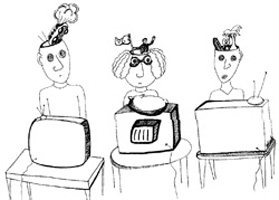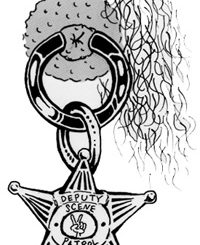 Mother Night
Mother Night
with Nick Nolte, Sheryl Lee, Anthony J. Robinow
Directed by Keith Gordon
Written by Kurt Vonnegut
by Kerry Joyce
Mother Night is based on the novel by Kurt Vonnegut of the same name, a bestseller, but one that is generally not as well known as some of his other books. If you were organizing your library shelves by genre instead of author, Mother Night might not repose alongside those others, although it does have the childlike innocence and simplicity reveling in and manifesting the profound and paradoxical in a way that characterizes all of Vonnegut’s work.
His writing is a sort of literary pop art which preceded Warhol in fact, if not in popularity. He is also one of the very few active adult witnesses to the bizarre tale that was World War II who significantly contributed to the cultural foment known as the sixties.
There are three things that Vonnegut understands more acutely than most and that exercise themselves within his considerable storytelling ability: a) World War II, b) Science, c) an existential melancholy resulting from a and b. Mother Night, though, has none of the science fiction so predominant in most of his other novels. Missing too is much of the zany humor. It is perhaps telling that Vonnegut appears briefly in the film version in a non-speaking role walking down a New York City sidewalk. The film credits list his role as “sad man on the street.”
What struck me first about the movie was the omission of any visual cues to the historical context for those scenes set after the war: No Buicks with egregious tail fins cruising by, no reel of synthesized documentary film footage of Khruschev pounding his shoe at the U. N. spliced in Oliver Stone-style, no brand-new leopard skin pillbox hats atop the sidewalk passersby.
The latter days of the tale simply belong to that strange time and place known as post-World War II America. In some ways that era ended ten years ago with the fall of the Berlin Wal, but the Western World has not yet exorcised all of its WWII demons. Another chapter is being written only now, with reports that the Swiss (THE SWISS!) helped the Nazis by safeguarding their stolen loot , and were indifferent to the pleas of its rightful owners and heirs, even after the war was over. “So it goes.”
If this be a period piece, the period is then as much today as it is the time when it was written, 1961. Mother Night was ahead of its time, “unstuck,” you might say, and in some respect remains so.
The story is by no means lacking Vonnegut’s trademark wit. In fact, Mother Night is one of the few books/movies that has attempted to make the dark specter of Nazism less terrifying by humanizing its adherents through humor and satire.
As we look back at World War II at the turn of the millennium, the generally held view is that although there were many terrifying and horrible things about Nazi Germany, the most terrifying and horrible aspect of all was that this regime rounded up and then murdered six million unarmed, innocent Jewish civilians.
This will be the prevailing view at the turn of the next millennium as well. While in no way trivializing the suffering of others, the fact is that minus the Holocaust, the story of World War II is not all that different from the story of World War I or a lot of other wars great and small since the beginning of time.
It is hard to imagine, unless you lived then, the extent to which the martial spirit and the story of “The Big One” permeated American culture up until the time of the Civil Rights movement and the Vietnam War, when field cannons and tanks served as the frescoes of most every Town Hall’s well-apportioned grounds. Equally hard to imagine and to comprehend is the extent to which The Holocaust didn’t figure into the history, in the popular imagination at that time.
There were the Nuremberg Trials, but while not exactly a historic footnote, the death of six million Jews was treated, for the most part, as a quick and easy way of establishing unequivocally just who were the good and the bad guys in this war. Never mind that boatloads of Jewish refugees were turned away in the shadow of the Statue of Liberty, that the Allies never did get around to bombing those death factories, or that Roosevelt was able to lead America into the war only after the Japanese attacked Hawaii.
Yes, there is plenty of guilt to go around, and not only was Vonnegut the only one injecting the Holocaust into the story at a time when the literature consisted of a diary by an adolescent girl named Anne Frank, but he also remains one of the only writers to deal with the issue of guilt over the entire episode to this day.
Perhaps as a German-American with an over-active conscience, Germany’s atrocities personally touch Vonnegut a little closer. “If I’d been born in Germany, I suppose I’d have been a Nazi…” Vonnegut writes in the forward. Then again, he might have been a victim too. And the idea of being evil’s lackey is more terrifying than being its victim. But for whatever reason, Vonnegut has chosen to explore the universality of what the rise of Nazism suggests about the human psyche.
Mother Night does have some basis in history, but it is not really a historical novel. The lead character, Howard W. Campbell, is an American-born playwright who moved to Germany before the war with his family at the age of eleven. He is recruited as a spy by the Americans and, as planned, takes a job broadcasting propaganda to the American troops while at the same time transmitting secrets to the Americans encrypted into his pro-Nazi tirades.
At the end of the war, American intelligence helps Campbell while at the same time, he disavows any knowledge of his activities on their behalf. Meanwhile his German, pro-Nazi father-in-law informs him that he suspected all along that he was a spy but said nothing because he believed Campbell’s talent as a propagandist outweighed anything he might have been doing on behalf of the Americans. His wife dies in the war, and Campbell lives out the peace as a war criminal on the lam preoccupied by his own loneliness, isolation, and despair.
The Campbell character is loosely based on a couple of American-born Nazis who, like Campbell, did broadcast propaganda to the Allied troops. But neither was a spy, and their impact consisted mostly of providing some badly needed comic relief for the troops who listened. One, William Joyce (Lord Haw Haw), was hanged by The British for treason. Like Vonnegut’s Campbell, Haw Haw was captured when a soldier recognized his voice.
While his Lordship’s attorney argued persuasively at the trial that since he’d been born in the United States, and moved from England to Germany before the two nations were at war, he was not a British subject, and therefore not a traitor. British justice was unmoved and hanged the little fascist anyway.
The other American-born Nazi propogandist was, like Campbell, an artist, and a man of letters, Ezra Pound. But America couldn’t see fit to prosecute one of its most illustrious poets, so they stashed him in a mental hospital for the rest of his natural days instead, though he was no more insane than any of our other illustrious poets.
Having lost faith in the utility of purposeful action, Howard W. Campbell half-heartedly hides out in New York City, and existentially dead pans his way through sometimes comic and sometimes sad encounters with an Auschwitz survivor who refuses to remember, another who refuses to forget, neo-Nazis, and American and Russian intelligence operatives.
I had never forgiven Nick Nolte for his starring role in a shallow political tract disguised as a major motion picture called Under Fire. But I suspected this movie was a winner as soon as I saw he was starring in it. I’ve also always refused to take John Goodman seriously as an actor, no matter how much people preach to me that I should, but he does a great job too.
Eventually, Campbell extradites to Israel, while maintaining his innocence based on his service as an American agent. Then, shortly before the trial begins, American intelligence does the right thing. Too late for Campbell though, the dynamic duo of good and evil triumph over existentialism once again. Campbell dies, as he lived after the war, for nothing.
When I have a strong attachment to a book, as I do with Mother Night, I watch the movie with the hopeful expectation of hating it. But Mother Night the movie is a more than adequate adaptation of the novel.



